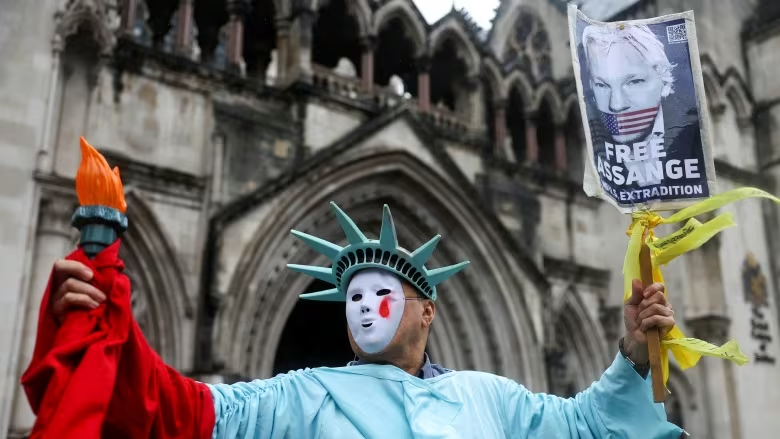
On Wednesday in London, an individual dressed in a costume holds a sign as part of a demonstration outside the high court. The protest occurred as supporters of WikiLeaks founder Julian Assange gathered on the day of his extradition appeal to the United States. (Photo credit: Toby Melville/Reuters)
In a tense courtroom showdown before Britain's High Court, attorneys for the U.S. government argued vehemently for WikiLeaks founder Julian Assange's extradition, painting a picture of a man who, far from being a mere journalist, had allegedly endangered countless lives through his actions. The stakes couldn't be higher as Assange's defence team fought tooth and nail to halt his extradition, which could mark the culmination of a legal battle spanning over a decade.
The prosecution's argument hinged on the assertion that Assange's actions went beyond the realm of journalism, with his alleged solicitation, theft, and indiscriminate dissemination of classified U.S. government documents posing a direct threat to innocent lives. According to the lawyers, Assange's conduct amounted to espionage rather than legitimate journalistic endeavours.
Throughout the two-day hearing, tension hung thick in the air as Assange's fate teetered on a knife's edge. His defence team sought to sway the court in their favour, pleading for a new appeal as a last-ditch effort to avert extradition. Meanwhile, the judges, Victoria Sharp and Jeremy Johnson remained tight-lipped, their decision looming ominously.
The possibility of extradition to the U.S. cast a long shadow over the proceedings. Should the court rule against him, Assange's fate would hang in the balance as he navigates the legal avenues available to him. Yet, with the spectre of extradition looming large, concerns abound that he could be swiftly whisked away to the U.S. before he can seek recourse through international channels.
At the heart of the matter lies Assange's indictment on a litany of charges, including espionage and computer misuse, stemming from WikiLeaks' publication of classified documents. Prosecutors allege that Assange actively facilitated the theft of sensitive information, endangering lives and compromising national security in the process.
Amidst the legal wrangling, Assange's supporters rallied behind him, painting him as a champion of transparency and a victim of political persecution. They argue vehemently against the charges, decrying them as a thinly veiled attempt to silence dissent and muzzle investigative journalism.
As the courtroom drama unfolds, the world watches with bated breath, acutely aware of the far-reaching implications of the High Court's decision. For Assange, the outcome could spell either freedom or a protracted legal battle fraught with uncertainty.















